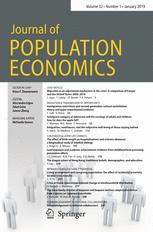A recent GLO Discussion Paper explores the vote on the Swiss minaret initiative in 2009 as a natural experiment to identify the effect of newly revealed reservations towards immigrants on their location choices. The research finds that the probability of immigrants to relocate to a municipality that unexpectedly revealed stronger negative attitudes towards them is significantly reduced in the time after the vote. The effect seems to apply to all immigrant groups – Muslim, non-European and European -, and to be stronger for high-skilled immigrants. The paper is now published in the Journal of Population Economics and available online. See also below.
GLO Discussion Paper of the Month of January 2019 published in the Journal of Population Economics, July 2019, Volume 32, Issue 3, pp 1043–1095!
See online on the Journal website.
GLO Discussion Paper No. 305, 2019.
The Deterrent Effect of an Anti-Minaret Vote on Foreigners’ Location Choices – Download PDF
by Slotwinski, Michaela & Stutzer, Alois
GLO Fellows Michaela Slotwinski & Alois Stutzer
Abstract: In a national ballot in 2009, Swiss citizens surprisingly approved an amendment to the Swiss constitution to ban the further construction of minarets. The ballot outcome manifested reservations and anti-immigrant attitudes in regions of Switzerland which had previously been hidden. We exploit this fact as a natural experiment to identify the causal effect of negative attitudes towards immigrants on foreigners’ location choices and thus indirectly on their utility. Based on a regression discontinuity design with unknown discontinuity points and administrative data on the population of foreigners, we find that the probability of their moving to a municipality which unexpectedly expressed stronger reservations decreases initially by about 40 percent. The effect is accompanied by a drop of housing prices in these municipalities and levels off over a period of about 5 months. Moreover, foreigners in high-skill occupations react relatively more strongly highlighting a tension when countries try to attract well-educated professionals from abroad.

Ends;

